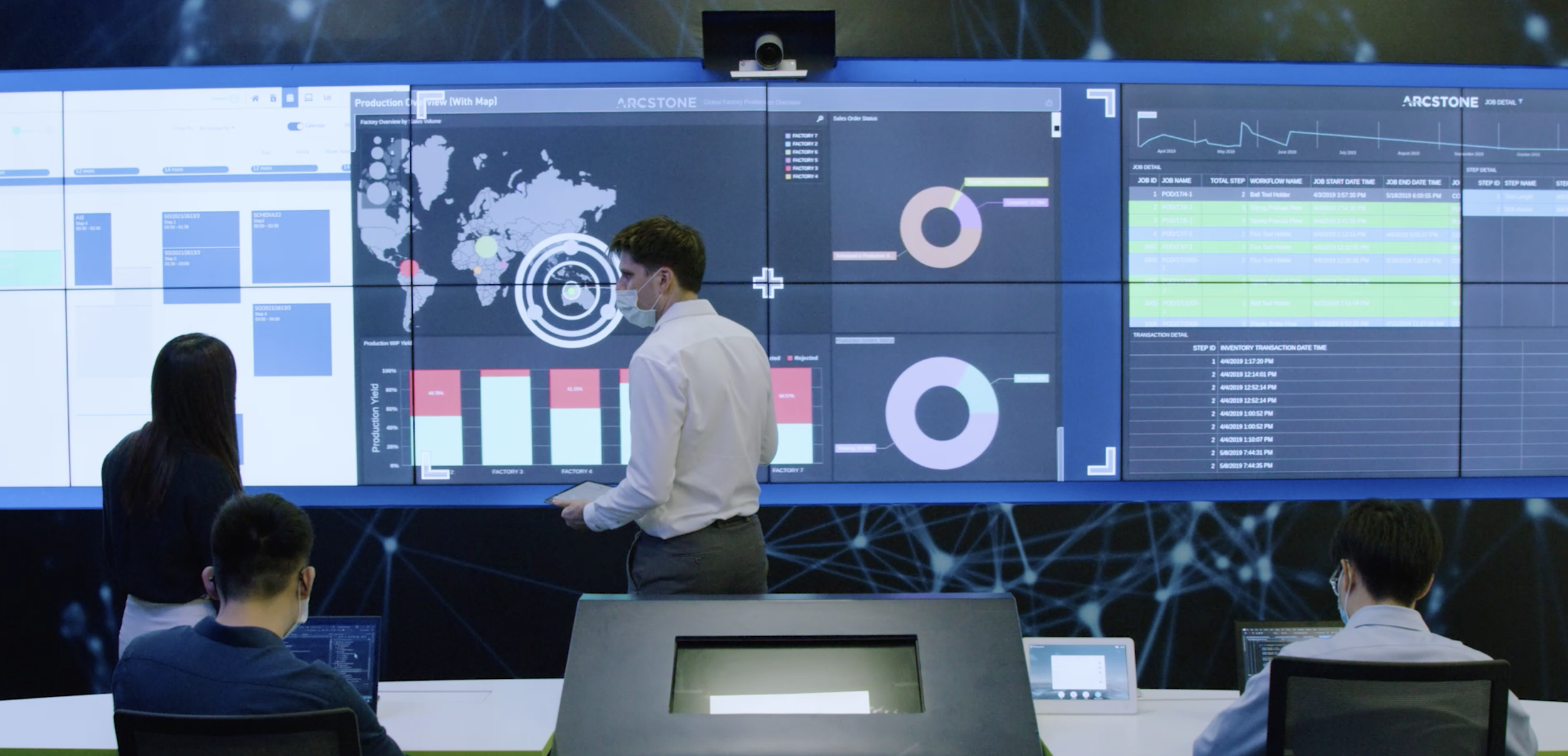Why We Invested: Arcstone
COVID19 put manufacturing in the news in ways that it has not been before the pandemic. Events since the early days of the pandemic leave no doubt that manufacturing will remain of primary concern for the foreseeable future.
For example; Domestic PPE manufacturing became an issue of sufficient concern that the United States Congressional Research Service issued this 71-page research report in December 2020. More recently, chip manufacturing has been in the news as shortages are now predicted to last till 2024, leading some manufacturers to cannibalize washing machines in efforts to make up for the shortfall.
Manufacturing is the process by which raw materials are turned into finished goods. It is a critical part of the world’s economy.
A virus like COVID19 is abstract and difficult for most people to picture. So while the PPE crisis raised concerns, the anxiety it caused was somewhat muted amongst people who were not frontline workers.
A more visceral and more relatable example of manufacturing’s importance to society is the ongoing baby-formula shortage that has been playing out in the United States since the COVID19 pandemic started in 2020. This became a full-blown crisis with the closure of an Abbott Laboratories manufacturing plant in Michigan.
News reports describe this as the worst baby formula shortage in decades, with the BBC reporting that stockout rates jumped from 11% in November 2021 to 30%, to 40% just a few weeks later around April 24. Moreover the same BBC article reports that there are 26 states with stockout rates higher than 40%, up from 7 just 3 weeks earlier.
The desperation caused by this baby formula shortage has compelled the White House to issue a statement about the steps it is taking to address the crisis. Additionally, Senator Kirsten Gillibrand, a member of President Biden’s party, is urging the Biden-Harris Administration to invoke the Defense Production Act as a means of ending this crisis.
Manufacturing is critical because it is the process by which raw materials are converted into the finished goods or products people use every day - yes, even something that seems as basic as infant formula.
IBISWorld estimates that, for 2022, manufacturing industry revenues in the United States amount to $6.0 trillion. Meanwhile, according to the National Association of Manufacturers (NAM), manufacturing accounts for about 11% of annual economic output.
The Biden-Harris Administration issued The Biden-Harris Plan to Revitalize American Manufacturing and Secure Critical Supply Chains in 2022 on February 24, and published FACT SHEET: Biden Administration Celebrates Launch of AM Forward and Calls on Congress to Pass Bipartisan Innovation Act on May 6, building on a growing bipartisan consensus that the United States needs to reverse the trend that has resulted in companies moving their manufacturing operations to China, and other countries in Asia.
Before these announcements from the White House, Intel announced on January 21 that it will invest more than $20 billion to establish a new, cutting-edge semiconductor chip manufacturing center in Ohio. The full investment could amount to $100 billion over the course of a decade.
Manufacturing is staging a comeback to the midwestern United States.
The Problem: Modern Manufacturing Supply Chains are Complex, Globally Distributed, and Opaque
Manufacturing supply chains are a complex arrangement of organizations, labor, equipment, machinery, intellectual property, industrial processes and design etc. To understand how complex a manufacturing supply chain can get consider the Ford Motor Company’s supply chain, which in 2012, was reported to include: 10 tiers between Ford and its most distant raw materials suppliers; 4,400 manufacturing sites around the world; 1,400 Tier 1 suppliers; 70 plants at which it built 6,000,000 cars per year, drawing from about 35 billion parts to assemble those cars.
Or, consider that, according to Boeing, “There are more than 3 million parts in a Boeing airplane.” That statement, and the fact that Boeing sources parts from all over the world gives us a sense of the complexity of Boeing’s supply chain.
The problem any company that manufactures products faces can be broken into 3 parts:
First, data is generated from hardware and software, and this data and information is disconnected and stored in siloed systems.
Second, there are too many manual and paper-based operations.
Third, there are strict regulatory requirements that govern the operations of firms that manufacture goods.
This means that, for a large company with extensive manufacturing supply chain operations, at any given time;
Decision-making is slow, and happens in reaction to events that have already disrupted supply chain operations rather than in anticipation of such incidents.
It is difficult to reduce errors, or, when an error has occurred, it is difficult to trace the source of the error for corrective measures to be implemented.
Regulatory audits become onerous and time consuming because the information that regulators require is not easily accessible for review.
It is impossible to fully optimize financial results because of the lack of visibility into conditions across the end-to-end supply chain operations.
This is where Arcstone comes in.
Arcstone: Fully Integrated and Real-Time Supply Chain Visibility in Global Manufacturing
Arcstone has developed a robust manufacturing execution system and a supply chain management toolset that, taken together, help its customers connect, monitor and control complex manufacturing systems and data flows on factory floors anywhere in the world. Using Arcstone, a company like Ford, Boeing, or any other manufacturer in any industry, could turn its network of suppliers into a single, digitally integrated and connected ecosystem with real time visibility, traceability, and optimization across the end-to-end manufacturing supply chain and production lifecycle.
Arcstone’s distinguishing features include;
Ease of Adoption; As you can imagine, within any manufacturing supply chain there are often small and medium size organizations that do not have the resources, sophistication, or expertise to adopt new, and seemingly complex, software technology. For such organizations, Arcstone has a freemium module that accomplishes the basic task of simply connecting them into the supplier network of their large commercial partner, like Ford or Boeing, through a digital toolset that is designed with mass adoption in mind. This module can be set up and deployed in 1 day.
Supply Chain Visibility; Arcstone’s customers can enable end-to-end visibility because the platform has two-way integration into legacy ERP and software systems, as well as two-way integration with machinery and equipment. The system is easily configured by the end-user to enable real-time data visualization and analysis. This functionality enables suppliers from across the chain; from the source of the raw material coming from the mines, farms, micro-factories, etc. all the way to the finished goods; to have direct real-time production visibility throughout the network, across organizational boundaries. This allows global manufacturers to quickly and accurately identify constraints as they emerge, and to then develop and test strategies to ensure effective management and full utilization of such constraints in order to maximize overall output.
Supply Chain Optimization; Finally, Arcstone enables its customers to optimize their supply chain operations with multi-tier supply chain traceability, in real-time. This enables customers to identify problems in the very early stages of development, before such problems become more costly to solve.
So far, Arcstone’s customers are seeing the benefits of adopting and implementing its suite of products, with customers reporting significant savings from;
Indirect workload savings,
Reductions in time to data capture,
Improvements in real-time data accuracy,
Savings from improved inventory management,
Increased accuracy in parts picking and usage,
Savings due to reductions in labor hours, and
Enhanced supplier collaboration to quickly preempt disruptions days, or sometimes weeks, in advance.
One area of ongoing research is the use of Arcstone’s platform to track the environmental footprint of manufacturing operations across the end-to-end supply chain.
Built and Tested in the World’s Factory
Arcstone’s Founder and CEO, Willson Deng developed a fascination for the problems that Arcstone solves while he was obtaining a Bachelor of Science in Industrial Engineering and Operations Research from the University of California, Berkeley and a Master of Science in Technology and Operations Research at INSEAD.
He established and located Arcstone in Singapore because of its proximity to manufacturing hubs across Asia.
Arcstone has employees and customers in Singapore, India, Indonesia, and Vietnam. The company is responding to the pull from some of its multinational customers, and is now establishing its United States headquarters in Farmington Hills, MI, with a satellite location already being set up in Chicago, IL.
Its existing customers come from Precision Engineering, Construction, Consumer Packaged Goods, Energy, Chemicals, Mining, Semiconductors, Electronics, Industrial Automation, Biomedicine, and Pharmaceuticals. Through its partners, Arcstone is available to customers globally.
Evidence of how robust Arcstone’s platform is described in this June 18, 2021 article published in The Straits Times in Singapore, New $18m lab set up to spur digital manufacturing, which describes a joint-effort by Singapore’s Agency for Science, Technology, and Research, and Arcstone, to make Arcstone’s digital manufacturing platform more readily available to companies and factories in Singapore as they compete for a greater share of the high value manufacturing market.
Potential Customers Are Actively Seeking Solutions
Due to the ongoing risk posed by COVID19, China’s Zero COVID policy, Russia’s invasion of Ukraine, and the accelerating Climate Crisis, corporate executives can no longer ignore the need for technology innovations that enable them to develop and maintain real-time awareness and control over events in the global, and extended supply chain ecosystems.
According to this April 2, 2020 article published in Supply Chain Brain, "Most enterprises have only 20% visibility into their supply chains, as opposed to the 70% to 90% percent needed to address key points of volatility where revenue and costs are at risk."
With Arcstone, large companies can monitor their manufacturing supply chains with a degree of granularity, flexibility, availability, and flexibility that has been lacking at a corresponding price-point, until now.
Because of Arcstone’s freemium modules, every large brand that adopts the platform can now bring even the smallest and least technologically sophisticated suppliers at every tier of its supply chain into its connected network, extending visibility and transparency to the farthest corners of any supply chain. This unprecedented connectivity enables Arcstone’s customers to monitor every detail that is pertinent to the operational and financial health of the end-to-end supply chain by identifying problems early and enabling companies to respond quickly to unforeseen problems.
As we say at REFASHIOND Ventures, we are #ObsessivelyEnthusiastic about what the team at Arcstone is building. The company is scaling globally, and seeking new customers in every market as well as investors with experience in supply chain technology, manufacturing technology, or enterprise technology.
As early-stage investors, we are encouraged that many more downstream investors have awoken to the opportunity in #SupplyChainTech. We couldn’t be more excited to back supply chain technology founders at the early stages of their journey to transform the way the world makes, buys, moves, stores, and consumes the products and services that we all need.







